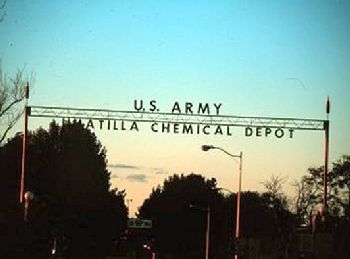
Publisher:
Bonnie King
CONTACT:
Newsroom@Salem-news.com
Advertising:
Adsales@Salem-news.com

~Truth~
~Justice~
~Peace~
TJP
Jan-27-2015 00:48

 TweetFollow @OregonNews
TweetFollow @OregonNews
Army Backs Out of Proposed Free Land Deal with Eastern Oregon's Economic Development Leaders
Salem-News.comAs in many cases, the answer may be found when you follow the money...
 Courtesy: www.globalsecurity.org |
(SALEM, Ore.) - If the Umatilla Chemical Depot is closed, and all munitions have been safely destroyed, why hasn’t the Army passed the land to Eastern Oregon’s economic development leaders?
According to Don Chance, project manager for the Columbia Development Authority, the United States Army may be backing out of their agreement to gift the land at no charge.
It was previously understood that the Army would “dispose of the property without recompense,” according to an application created some time ago, called the Economic Development Conveyance. That no longer seems to be the case.
The United States Army May Hope to Recoup Losses
The Umatilla Chemical Depot spans thousands of acres. The depot once held the nation’s supply of chemical weaponry, such as nerve and mustard gas.
These chemicals were safely destroyed in 2011, but the cost of destroying the weapons, and other setbacks, may have overwhelmed the Army causing them to go back on their agreement with local economic developers.
According to Don Chance: “Instead of turning over the site of the Umatilla Chemical Depot for free, the Army is considering how to bring in revenue from the disposition of the property.”
(This goes against the Army’s original agreement, which would have resulted in all acres being freely distributed among two northeast Oregon counties, two Columbia River port authorities, and the Umatilla tribe.)
The Army hopes they’ll recoup some of their losses, but hasn’t officially stated whether or not they’ll sell the land. Their big issue is that they dealt with additional expenses due to the destruction of asbestos-laced buildings, which should cause some concern for the community.
Asbestos is a very toxic, dangerous material and exposure to the material can result in mesothelioma, and other cancers. It’s incredibly expensive to remove asbestos because it’s so hazardous.
The Army hasn’t stated exactly how much the asbestos removal cost them, but it’s possible to reflect on past cleanups and determine the cost to be over a million dollars. For example: In 2008, Klamath Falls, OR was forced to cleanup military asbestos at the North Ridge Estates subdivision.
The U.S. Navy acquired the land in 1944, and used it to build over 80 buildings, which included over 1,533 tons of asbestos.
The buildings were torn down, and the land was purchased by Klamath Falls, who then built the subdivision. Unfortunately, the asbestos contaminated the ground, which then exposed residents to asbestos. The asbestos cleanup cost in the millions, and local government was hard-pressed to afford it.
Asbestos is incredibly dangerous, and it’s essential to determine if you’ve been exposed to the material. If you even remotely suspect that you've been exposed, consult this comprehensive list of companies and products containing asbestos. This should help anyone hoping to determine if their exposure risk, in Oregon or anywhere else.
In the End, Asbestos Costs More Than it’s Worth
Asbestos products were (and, sometimes still are) used because they are far cheaper than the alternatives. Like many companies, the Army wanted to keep costs down.
Unfortunately, this hasn't worked out quite as planned because removing asbestos costs far more than it would have cost to use a safer alternative. Plus, exposure to asbestos has led to many lawsuits, including suits against the United States military.
This is all very unfortunate for the citizens of eastern Oregon, who can no longer look forward to utilizing the land they were promised. In the end, it may be for the best.
Asbestos exposure may still pose a risk to citizens. Then again, much of the area was not exposed, and who knows what that land will be used for now.
 |
Articles for January 26, 2015 | Articles for January 27, 2015 | Articles for January 28, 2015



Quick Links
DINING
Willamette UniversityGoudy Commons Cafe
Dine on the Queen
Willamette Queen Sternwheeler
MUST SEE SALEM
Oregon Capitol ToursCapitol History Gateway
Willamette River Ride
Willamette Queen Sternwheeler
Historic Home Tours:
Deepwood Museum
The Bush House
Gaiety Hollow Garden
AUCTIONS - APPRAISALS
Auction Masters & AppraisalsCONSTRUCTION SERVICES
Roofing and ContractingSheridan, Ore.
ONLINE SHOPPING
Special Occasion DressesAdvertise with Salem-News
Contact:AdSales@Salem-News.com

Terms of Service | Privacy Policy
All comments and messages are approved by people and self promotional links or unacceptable comments are denied.
[Return to Top]
©2025 Salem-News.com. All opinions expressed in this article are those of the author and do not necessarily reflect those of Salem-News.com.